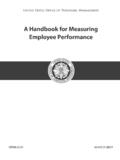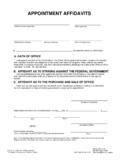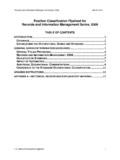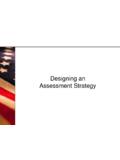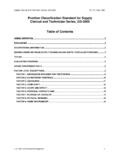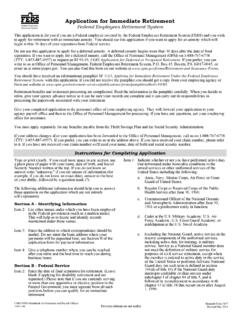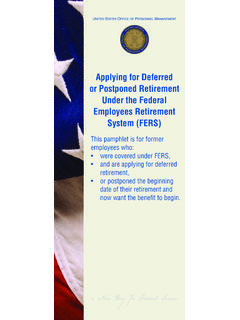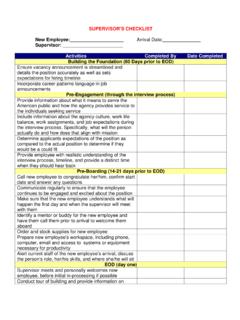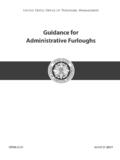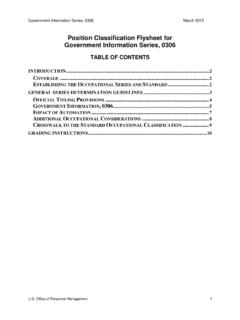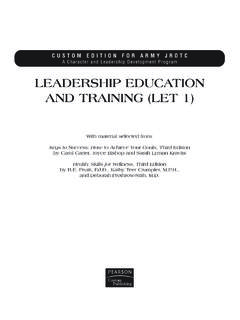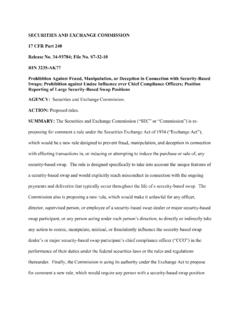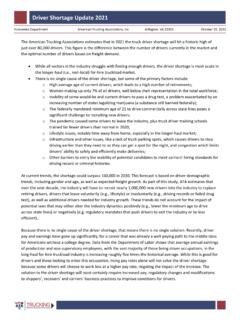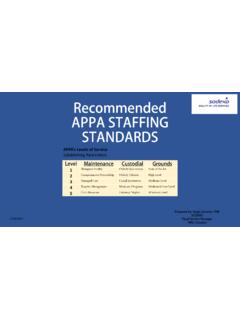Transcription of All Professional Engineering Positions, 0800
1 1 All Professional Engineering Positions, 0800 Individual Occupational Requirements Basic Requirements: A. Degree: Engineering . To be acceptable, the program must: (1) lead to a bachelor s degree in a school of Engineering with at least one program accredited by ABET; or (2) include differential and integral calculus and courses (more advanced than first-year physics and chemistry) in five of the following seven areas of Engineering science or physics: (a) statics, dynamics; (b) strength of materials (stress-strain relationships); (c) fluid mechanics, hydraulics; (d) thermodynamics; (e) electrical fields and circuits; (f) nature and properties of materials (relating particle and aggregate structure to properties).
2 And (g) any other comparable area of fundamental Engineering science or physics, such as optics, heat transfer, soil mechanics, or electronics. OR B. Combination of education and experience -- college-level education, training, and/or technical experience that furnished (1) a thorough knowledge of the physical and mathematical sciences underlying Engineering , and (2) a good understanding, both theoretical and practical, of the Engineering sciences and techniques and their applications to one of the branches of Engineering . The adequacy of such background must be demonstrated by one of the following: 1. Professional registration or licensure -- Current registration as an Engineer Intern (EI), Engineer in Training (EIT)1, or licensure as a Professional Engineer (PE) by any State, the District of Columbia, Guam, or Puerto Rico.
3 Absent other means of qualifying under this standard, those applicants who achieved such registration by means other than written test ( , State grandfather or eminence provisions) are eligible only for positions that are within or closely related to the specialty field of their registration. For example, an applicant who attains registration through a State Board's eminence provision as a manufacturing engineer typically would be rated eligible only for manufacturing Engineering positions. 2. Written Test -- Evidence of having successfully passed the Fundamentals of Engineering (FE)2 examination or any other written test required for Professional 1 For more information about EI and EIT registration requirements, please visit the National Society of Professional Engineers website at: 2 The FE examination is not administered by the U.
4 S. Office of Personnel Management. For more information, please visit: 2 registration by an Engineering licensure board in the various States, the District of Columbia, Guam, and Puerto Rico. 3. Specified academic courses -- Successful completion of at least 60 semester hours of courses in the physical, mathematical, and Engineering sciences and that included the courses specified in the basic requirements under paragraph A. The courses must be fully acceptable toward meeting the requirements of an Engineering program as described in paragraph A. 4. Related curriculum -- Successful completion of a curriculum leading to a bachelor's degree in an appropriate scientific field, , Engineering technology, physics, chemistry, architecture, computer science, mathematics, hydrology, or geology, may be accepted in lieu of a bachelor s degree in Engineering , provided the applicant has had at least 1 year of Professional Engineering experience acquired under Professional Engineering supervision and guidance.
5 Ordinarily there should be either an established plan of intensive training to develop Professional Engineering competence, or several years of prior Professional Engineering -type experience, , in interdisciplinary positions. (The above examples of related curricula are not all-inclusive.) Note: An applicant who meets the basic requirements as specified in A or B above, except as noted under , may qualify for positions in any branch of Engineering unless selective factors indicate otherwise. Additional Experience and Training Provisions for Graduates of Engineering Programs: a. Superior academic achievement at the baccalaureate level in an Engineering program is qualifying for GS-7.
6 B. A combination of superior academic achievement and 1 year of appropriate Professional experience is qualifying at GS-9. c. Applicants with an Engineering bachelor s degree who have appropriate experience as a technician equivalent to grade GS-5 or higher may have such experience credited for grade GS-7 only on a month-for-month basis up to a maximum of 12 months. d. Successful completion of a 5-year program of study of at least 160 semester hours leading to a bachelor's degree in Engineering is qualifying at GS-7. Completion of such a program and 1 year of appropriate Professional experience is qualifying at grade GS-9. Definition of Professional Engineering Experience: The Professional Engineering experience required for grades GS-7 and above is defined as non-routine Engineering work that required and was characterized by (1) Professional knowledge of Engineering ; (2) Professional ability to apply such knowledge to Engineering problems; and (3) positive and continuing development of Professional knowledge and ability.
7 Professional knowledge of Engineering is defined as the comprehensive, in-depth knowledge of mathematical, physical, and Engineering sciences applicable to a specialty field of Engineering 3 that characterizes a full 4-year Engineering program leading to a bachelor's degree, or the equivalent. Professional ability to apply Engineering knowledge is defined as the ability to (a) apply fundamental and diversified Professional Engineering concepts, theories, and practices to achieve Engineering objectives with versatility, judgment, and perception; (b) adapt and apply methods and techniques of related scientific disciplines; and (c) organize, analyze, interpret, and evaluate scientific data in the solution of Engineering problems.
8 Types of Creditable Experience: Professional work in Engineering , like that in other professions, is marked by continuing personal effort to keep abreast of the advancing and changing discipline. Continuing education in Engineering and related fields is an important element of full Professional competence as an engineer that should be considered in evaluating the qualifications of applicants for Professional Engineering positions. In some situations, experience may be creditable even if it is not clearly Professional Engineering work. In such cases, the experience must have been preceded by prior responsible Professional Engineering experience and must contribute directly and significantly to the applicant's Engineering competence.
9 For example, an engineer might be assigned to a management-type position in preparation for assumption of higher-level responsibilities in Engineering project or program management. Graduate Education: 1. Regardless of the field of undergraduate study, completion of the requirements for a master's or higher degree in Engineering is fully qualifying for the grade indicated, provided the applicant's total background, , education and any experience, demonstrates evidence of knowledge, skills, and abilities that are substantially equivalent to those acquired through the successful completion of the courses specified in paragraph A. 2. With a bachelor's degree in Engineering , graduate education in a related field is acceptable in lieu of graduate study in Engineering for appropriate types of positions.
10 For example, a Bachelor of Science in Engineering plus a master's degree in business administration would be qualifying for Industrial Engineer, GS-9, but not for GS-9 laboratory positions in research and development. The key consideration in determining if such graduate education should be credited is whether or not the education provided the knowledge, skills, and abilities necessary to perform the work of the position being filled. Special Competence in Particular Areas of Engineering : Many Engineering positions demand specific competence in a particular function or area. For such positions, agencies may use selective factors to identify those applicants whose records show evidence of the required capabilities.
